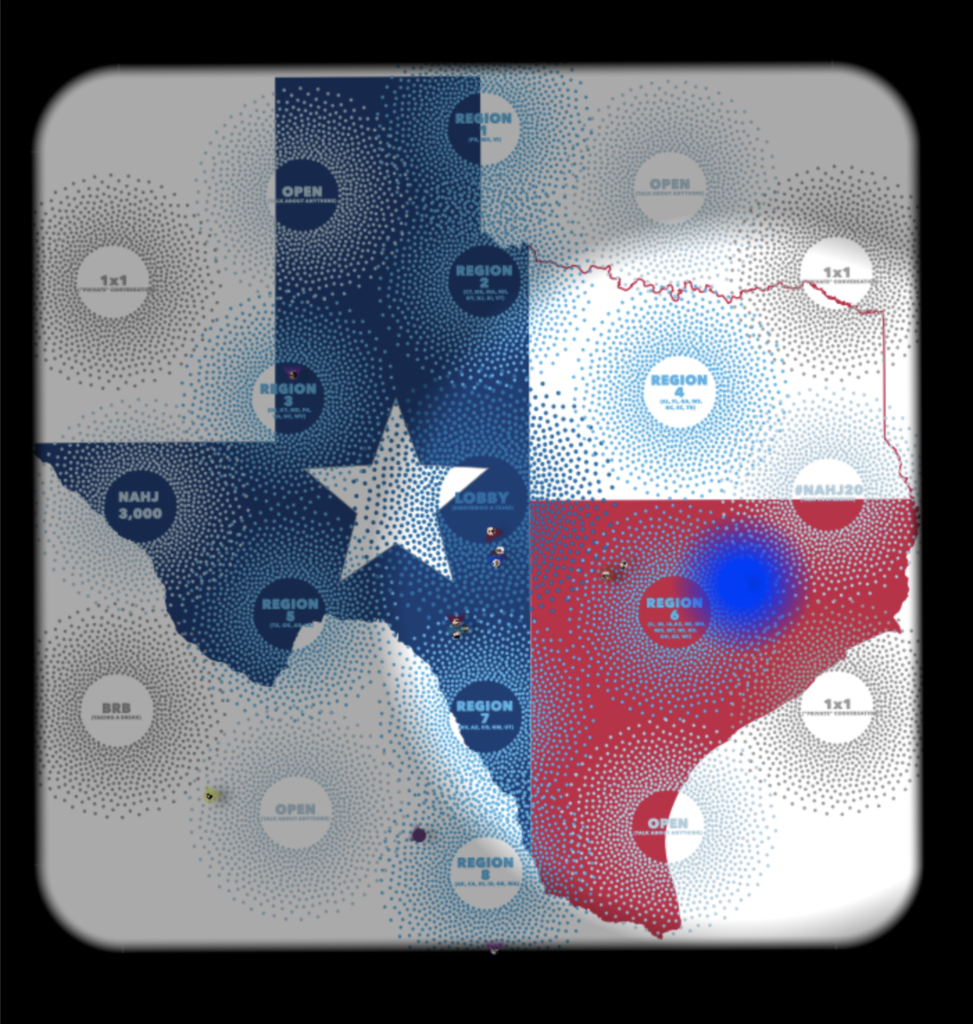‘This is fun but weird:’ NAHJ takes the party virtual with Gran Baile and a much-anticipated Tejano party

SOMEWHERE, The Internet — Conversations weave in and out, layering over one another as NAHJ members — in the form of small colorful dots — streak across the digital landscape of the 2020 conference’s most anticipated after-party.
The 2020 Tejano party was unlike any other. In the place of a Texas flag hung in the center of a hotel suite or outdoor patio, the virtual room was a Texas flag — enormous, glowing, red, white and blue. There was no bathtub filled with beer or bottles of tequila lining a kitchenette, unless, of course, you brought your own.
“This is fun, but weird.”
“I heard someone say we’re like little Pac-Man people.”
“We’re in the Matrix.”
“I can hardly hear you.”
The two most anticipated festivities on the final night of the annual National Association of Hispanic Journalist conference — the official Gran Baile and the notorious Tejano party — went virtual for the first time this year, capping off the historic online event with a decidedly digital farewell.
While some elements of a professional conference, like a career fair or a panel, can be translated with relative ease, hosting a party online with the same vigor an in-person fiesta comes with a host of challenges, NAHJ spokeswoman BA Snyder said.
“There’s an energy in this, like, uplifting nature that takes place only when we’re face to face,” Snyder said. “I’m not sure virtual can ever replace that.”
For longtime member and El Sentinel editor Jennifer Marcial, the Gran Baile has always been one of the highlights of the annual gathering. She has gone almost every year for more than a decade, even when she was a student. In anticipation of the Baile, she plans out her outfits with friends — sometimes they even coordinate.
When the pandemic forced the in-person convention to go virtual, she was deflated. She would go, she thought, but not do anything special for the virtual dance party.
It had been a hard day — she had had a medical procedure done and wasn’t feeling her best. But when she saw NAHJ tweet a photo of her and her friends at a previous Gran Baile celebration, she decided to go all out.
She beamed into the party Saturday sparkling in gold sequins and bright purples.
Marcial said she was impressed by the association’s ability to replicate the conference experience across digital platforms. The organization hosted the Baile on a platform called Shindig, which allowed participants to both see the DJ and presenters on a virtual stage while they could still engage in smaller video chats.
“The chat version was a bit complicated,” Marcial said. “But I think that overall, given how 2020 has been, I think that NAHJ and NABJ did an amazing job translating the real life experience as best as possible.”
For DJ Carlos Rico, the Gran Baile is the culmination of all the work that gets put into the conference throughout the week. Though the platform allowed him to engage with the audience by bringing them onto the “stage” and taking song requests, he said, keeping the energy level high was a challenge.
“It’s really about me just trying to get people hyped up,” Rico said. “Getting people dancing to their favorite songs and having a good time.”
Recreating the exclusive Tejano after-party — known for its surprise location and word-of-mouth invites, packed boisterous rooms and roaming festivities that last into the early morning hours before hotel security shuts it down — was especially difficult.
“We’re used to hugging and touching and feeling and high-fiving and clapping and laughing,” longtime member and Tejano party organizer Maury Vasquez said. “Those are the kind of things, you know, that we can’t recreate. We can’t recreate the hugs. We can’t recreate that old last big squeeze when you say ‘Okay. We’ll see you next year.'”
Making sure the party could still go on this year was a challenge NAHJ member and CNN editor Joe Ruiz decided to take on. The party has been held by NAHJ’s Texas contingent every year since its start in 1984. For many, the party marks the official end of the conference. It offers the Latino journalists gathered together a chance for one last toast, one last moment of joy and togetherness before a morning of goodbyes.
“The thought of us not having one never occurred to me,” Ruiz said. “That’s what we do.”
This year’s Tejano party was notably smaller — only about a dozen or so people, compared to the hundreds who have squeezed into hotel suites and lobbies and rooftops in years past. To get an invitation, members slid into organizers’ DMs, instead of tagging along with friends in the know.
It was also tamer. Though a member wandered in with a police-officer avatar to break up the party, the revelry ended early — well before midnight.
Those who went to the party, hosted on digital platform High Fidelity, were still able to find spontaneous conversation, roaming the sprawling virtual room or lingering by a DJ playing music off to the side.
NAHJ member and Newsday reporter Keldy Ortiz said the virtual format may be something members will come to embrace, since board members on Saturday floated the idea of keeping NAHJ’s conference virtual in 2021.
“It could very well be something we move forward with in conferences to come,” he said. “It’s always good to keep traditions alive, whether it’s in-person or not.”
Carmen Molina Acosta is a junior at the University of Maryland, where she studies journalism and international development and conflict management. She has worked as a special projects editor for The Diamondback, Maryland’s independent student newspaper, and is a fellow with the Emma Bowen Foundation. Reach her at carmolinacosta [at] gmail [dot] com and on Twitter @carmenmolina_a.
Bio text